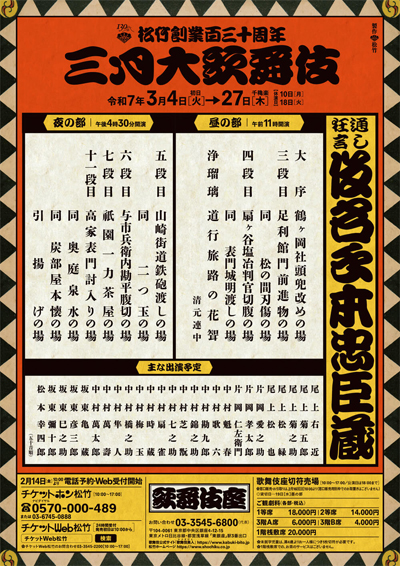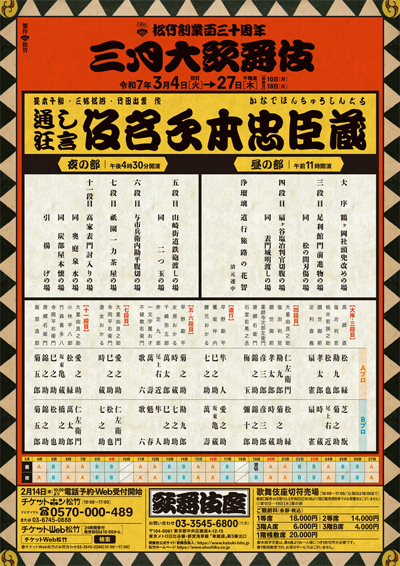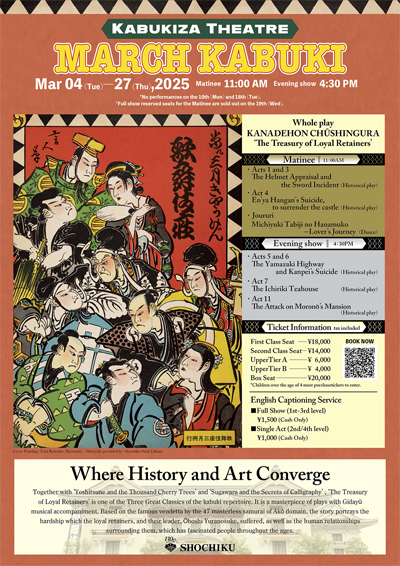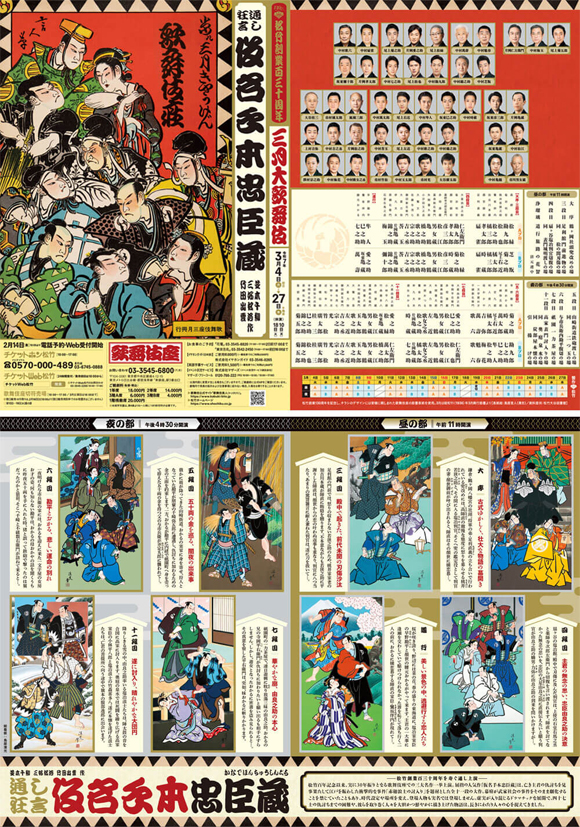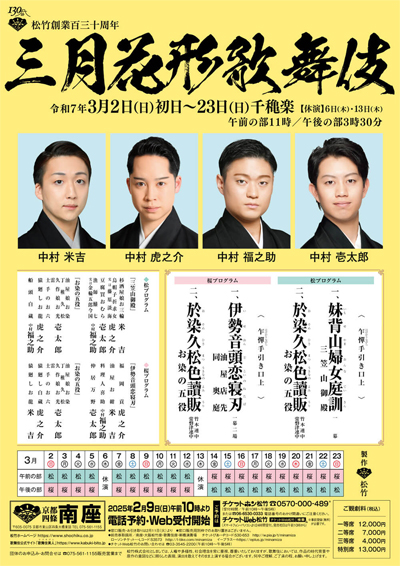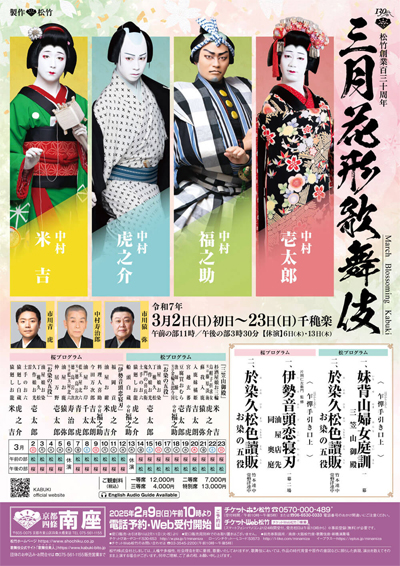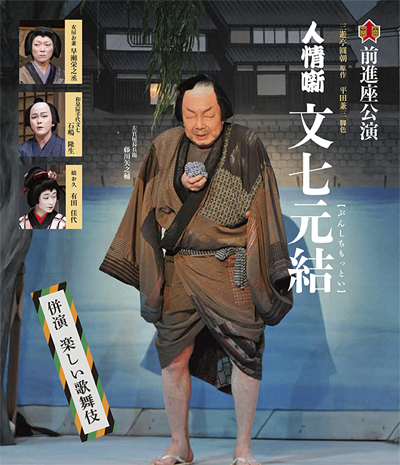| Casting |
Living National Treasure Onoe Kikugor˘, Living National Treasure Kataoka Nizaemon, Living National Treasure Nakamura Baigyoku, Living National Treasure Nakamura Karoku,
Nakamura Kaishun, Nakamura Manju, Nakamura Shikan, Nakamura Senjaku, Onoe Kikunosuke, Kataoka Ainosuke, Nakamura Kankur˘, Nakamura Shichinosuke, Matsumoto K˘shir˘, Kataoka Takatar˘, Nakamura Kinnosuke, Band˘ Yajűr˘, Band˘ Minosuke, Nakamura Hayato,
Onoe Matsuya, Band˘ Hikosabur˘, Nakamura Tokiz˘, Onoe Ukon, Kamimura Kichiya, Kataoka Kamez˘, Band˘ Kamez˘, Nakamura Mantar˘, Nakamura Hashinosuke,
ďtani Keiz˘, Nakamura Matsue, Ichikawa Omez˘, Nakamura Kikaku, Sawamura S˘nosuke, Nakamura Kangyoku, ďtani Hirotar˘, Ichimura Takematsu, Nakamura Utanosuke, Onoe Sakon, Arashi Kitsusabur˘, Nakamura Kamenoj˘, Nakamura Kichinoj˘, Ichimura Kitsutar˘, Kataoka Matsunosuke, Nakamura Baika, Nakamura Tamatar˘, Ichimura Hikaru
|
| Comments |
The March Grand Kabuki at the Kabukiza. The play "Kanadehon Chűshingura" (The Treasure of 47 Loyal Retainers) is the most
popular in the Kabuki repertory and is known throughout the world. There will be casting A and casting B depending on the day of the performances.
Kabuto Aratame: daimy˘ lords from around the country
gather for an important ceremony in the presence of Tadayoshi (Nakamura Senjaku), the younger brother
of the Sh˘gun. Under the watchful eye of the official Moron˘ (Onoe Sh˘roku/Nakamura Shikan),
lords En'ya Hangan (Nakamura Kankur˘/Onoe Kikunosuke) and Wakasanosuke (Onoe Matsuya/Onoe Ukon) have been charged
with making sure everything goes according to protocol. En'ya Hangan's wife Kaoyo
(Kataoka Takatar˘/Nakamura Tokiz˘) is asked to identify a helmet to be used in the ceremony.
Moron˘ is in love with Kaoyo and tries to woo her, but Wakasanosuke stops him.
In return, Moron˘ uses his position of authority to berate the young lord and
Wakasanosuke decides to kill Moron˘.
Shinmotsu/Ninj˘: the next morning at the Sh˘gun's mansion,
Wakasanosuke's head retainer bribes Moron˘ to keep his master from causing an
incident and although Wakasanosuke is about to attack Moron˘, the aged official
groveling stops him. As a result, though, Moron˘ is frustrated and angry and
vents his feelings on En'ya Hangan, especially after Hangan innocently brings him
a letter in which Kaoyo refuses Moron˘'s love. Moron˘ steadily insults Hangan,
who tries to ignore the pressure, but finally draws his sword and attacks.
Drawing a sword in the Sh˘gun's palace is a crime punishable by death,
but Moron˘ himself escapes with only a slight wound as others within
the mansion hurry in to stop Hangan.
Hangan Seppuku/Shiro Akewatashi: emissaries from the Sh˘gun arrive at
En'ya Hangan's mansion to announce that he has received the strictest penalty for
his actions. He is ordered to commit ritual suicide and his household is to be
disbanded. Hangan's hate for Moron˘ grows when he hears that Moron˘
has received no punishment. Hangan waits and waits for his head retainer,
but he does not arrive. Finally, Hangan plunges in the blade.
At that moment, his head retainer ďboshi Yuranosuke (Living National Treasure Kataoka Nizaemon/Onoe Sh˘roku) arrives from their home
province. With his last breaths, Hangan gives Yuranosuke the knife he used to
commit suicide and tells him to take revenge. Now that the clan has been disbanded,
Hangan's men become masterless samurai. Though some urge an immediate attack on
Moron˘, Yuranosuke bids them not to do anything rash. When alone in front of the
closed mansion gates, though, he secretly reveals his determination that his
lord will not have died in vain.
Featuring also Living National Treasure Nakamura Baigyoku/Band˘ Yajűr˘, Nakamura Kinnosuke and Band˘ Hikosabur˘ in the roles of Ishid˘ Umanoj˘, Hara G˘emon and Yakushiji Jirozaemon.
Ochiudo: after the death of his lord, the retainer Kanpei (Nakamura Hayato/Kataoka Ainosuke)
and his lover, the lady-in-waiting Okaru (Nakamura Shichinosuke/Nakamura Manju) flee to Okaru's home,
a farmer's house in the country. Kanpei feels responsible for the events
since he was having a romantic tryst and was not at his master's side at
the crucial moment. He tries to commit suicide, but Okaru stops him and
convinces him that they should go to her home as husband and wife and
wait for the right moment for him to be reinstated.
Featuring Band˘ Minosuke/Band˘ Kamez˘ in the role of Sagisaka Bannai.
Tepp˘ Watashi/Futatsudama/Kanpei Harakiri: Kanpei (Onoe Kikunosuke/Nakamura Kankur˘) lives a
poor life with Okaru (Nakamura Tokiz˘/Nakamura Shichinosuke) at her parents' rural home. Kanpei desperately
wants to take part in the vendetta against Moron˘, but must come up with the
money necessary to finance his part in it. Secretly, Okaru and her family
decide that the only way to raise the money is to sell her to the pleasure quarters.
On a lonely highway, a highway thief named Sadakur˘ (Onoe Ukon/Nakamura Hayato) kills her father
while he is on the way home from sealing the deal and the money is stolen. In a
bizarre twist of events, Kanpei kills the robber while hunting on a dark night
and finds the money. The fabric of the wallet, though, seems to prove that he
has murdered his father-in-law. Kanpei commits ritual suicide to take
responsibility, not only for the death of this father-in-law, but also
for being absent when his lord needed him most.
Featuring Nakamura Manju/Band˘ Minosuke, Nakamura Manju/Nakamura Kaishun and Living National Treasure Nakamura Karoku in the roles of Senzaki Yagor˘, Osai (proprietress of the Ichimonjiya) and Fuwa Kazuemon.
Gion Ichiriki Jaya: Yuranosuke (Kataoka Ainosuke/Living National Treasure Kataoka Nizaemon) spends his days and nights
in the pleasure quarters of Ky˘to in an effort to make Moron˘ believe he is not
planning a vendetta. His acting is so good that even men in his own group believe
he has given his life up to pleasure. Moron˘ is not so easily convinced, though,
and has sent spies, including a former retainer of En'ya Hangan, to find
Yuranosuke's true intentions. Yuranosuke finds himself tested to the limits
by the spy, and is even forced to eat meat on the anniversary of Hangan's death,
a strong taboo. Okaru (Nakamura Tokiz˘/Nakamura Shichinosuke), now a courtesan, is also at the Ichiriki
Teahouse. She catches a glimpse of a letter to Yuranosuke detailing plans for
the vendetta, but he sees her and offers to buy out her contract, knowing he
must kill her to keep the vendetta a secret. Okaru's brother Teraoka Heiemon (Band˘ Minosuke/Onoe Matsuya),
a servant in the Hangan household, has also come to the teahouse and when he
hears that Yuranosuke is to buy out her contract, he realizes his true intentions.
Heiemon tries to convince Okaru to let him kill her as such an act may allow
him to take part in the vendetta as well. Hearing that Kanpei is now dead,
Okaru agrees, but observing their loyal actions, Yuranosuke spares Okaru and
allows Heiemon to join the vendetta.
Uchiiri/Okuniwa Sensui/Shibabeya: disguised as firemen, En'ya Hangan's
retainers attack Moron˘'s mansion on a snowy night. After a fierce fight, they
find Moron˘ hiding in a charcoal shed and take revenge for their lord's wrongful
death. Featuring Kataoka Ainosuke/Living National Treasure Kataoka Nizaemon, Living National Treasure Onoe Kikugor˘, Band˘ Minosuke/Onoe Matsuya, Nakamura Kinnosuke, Onoe Sh˘roku/Nakamura Manju and Band˘ Kamez˘/Nakamura Hashinosuke in the roles of Yuranosuke, Hattori Itsur˘, Teraoka Heiemon, Hara G˘emon, Kobayashi Heihachir˘ and Takemori Kitahachi.
Source: Earphone Guide website
|

